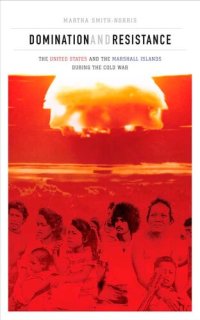
Ebook: Domination and Resistance: The United States and the Marshall Islands During the Cold War
Author: Martha Smith-Norris
- Year: 2016
- Publisher: University of Hawai‘i Press
- City: Honolulu
- Language: English
- pdf
Domination and Resistance illuminates the twin themes of superpower domination and indigenous resistance in the central Pacific during the Cold War, with a compelling historical examination of the relationship between the United States and the Republic of the Marshall Islands. For decision makers in Washington, the Marshall Islands represented a strategic prize seized from Japan near the end of World War II. In the postwar period, under the auspices of a United Nations Trusteeship Agreement, the United States reinforced its control of the Marshall Islands and kept the Soviet Union and other Cold War rivals out of this Pacific region. The United States also used the opportunity to test a vast array of powerful nuclear bombs and missiles in the Marshalls, even as it conducted research on the effects of human exposure to radioactive fallout.
Although these military tests and human experiments reinforced the US strategy of deterrence, they also led to the displacement of several atoll communities, serious health implications for the Marshallese, and widespread ecological degradation. Confronted with these troubling conditions, the Marshall Islanders utilized a variety of political and legal tactics--petitions, lawsuits, demonstrations, and negotiations--to draw American and global attention to their plight. In response to these indigenous acts of resistance, the United States strengthened its strategic interests in the Marshalls but made some concessions to the islanders. Under the Compact of Free Association (COFA) and related agreements, the Americans tightened control over the Kwajalein Missile Range while granting the Marshallese greater political autonomy, additional financial assistance, and a mechanism to settle nuclear claims.
Martha Smith-Norris argues that despite COFA's implementation in 1986 and Washington's pivot toward the Asia-Pacific region in the post-Cold War era, the United States has yet to provide adequate compensation to the Republic of the Marshall Islands for the extensive health and environmental damages caused by the US testing programs.
Although these military tests and human experiments reinforced the US strategy of deterrence, they also led to the displacement of several atoll communities, serious health implications for the Marshallese, and widespread ecological degradation. Confronted with these troubling conditions, the Marshall Islanders utilized a variety of political and legal tactics--petitions, lawsuits, demonstrations, and negotiations--to draw American and global attention to their plight. In response to these indigenous acts of resistance, the United States strengthened its strategic interests in the Marshalls but made some concessions to the islanders. Under the Compact of Free Association (COFA) and related agreements, the Americans tightened control over the Kwajalein Missile Range while granting the Marshallese greater political autonomy, additional financial assistance, and a mechanism to settle nuclear claims.
Martha Smith-Norris argues that despite COFA's implementation in 1986 and Washington's pivot toward the Asia-Pacific region in the post-Cold War era, the United States has yet to provide adequate compensation to the Republic of the Marshall Islands for the extensive health and environmental damages caused by the US testing programs.
Download the book Domination and Resistance: The United States and the Marshall Islands During the Cold War for free or read online
Continue reading on any device:

Last viewed books
Related books
{related-news}
Comments (0)